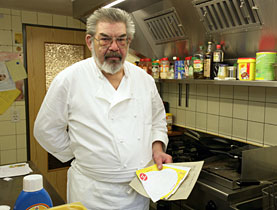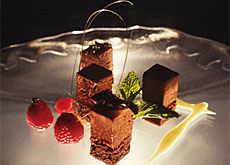Tickling the taste buds with a computer mouse

An online platform has been launched by a group of Swiss businessmen aimed at encouraging connoisseurs to rate and share advice on their favourite restaurants.
iTaste will also allow restaurants to contact their patrons directly for advertising purposes, according to the promoters.
Its recent launch comes as the traditional French Michelin guide decided to suspend its Austrian edition as well as those on restaurants in Las Vegas and Los Angeles in the United States.
Michelin currently has 26 different editions in 23 countries. It is due to publish a new guide on the Japanese cites of Kyoto-Osaka at the end of the year.
The idea behind iTaste is fairly simple, according to engineer Paul de Rochefoucauld, the brains behind the platform.
“We wanted to come up with something between [the social platform] Facebook and the Guide Michelin. Your friends serve up a custom-built gastronomic guide, so to speak.”
The idea is based on observations that enthusiastic recommendations by friends often make gourmets want to try out the cuisine of a new restaurant.
Everyone who subscribes to iTaste can add comments and reviews about a restaurant together with their personal details. It is also possible to research the food scene of a particular city for culinary highlights, to check out the favourite restaurants of bankers, those chosen by most Parisians or those particularly popular with female customers.
The platform makes it easy for patrons to access a transparent source of information, according to de Rochefoucauld.
He says the comments by professional critics are often based on criteria that are very different from those of average customers.
“There is nothing more valuable than getting recommendations from a friend who shares your own taste in good cuisine,” he said. “I’m convinced this new interactive tool will revolutionise the way hotels and restaurants are reviewed.”
Trump card
De Rochefoucault points out that iTaste has something more to offer than similar online services, including tripadvisor.com.
“On our site it is possible to clearly identify the authors of the comments and opinions,” he said.
To ensure its independence iTaste does not run advertisements on its sites. Its source of income is a service that puts restaurant professionals in contact with customers.
“A subscription to iTaste allows the restaurants to obtain access to details of the people who wrote the reviews and recommendations,” said de Rochefoucault.
For him such a service makes perfect sense because chefs and restaurant owners rarely even know the names of their clients.
“This is our trump card. We provide restaurant managers with a database of customer details.”
They could, for instance, send thank-you messages or the menus to their faithful patrons, according to de Rochefoucault.
Reviewers born
The restaurant industry has seen dramatic changes over the past few decades, says restaurant critic Luigi Bosia.
“Until about 50 years ago there was no noticeable difference between the opening of a new restaurant and a hairdresser’s,” said Bosia who has reviewed restaurants for many decades and also published several books.
There was neither an interest in critical reviews on the quality of food and service nor were there people with the necessary expertise to produce them.
But the situation changed mainly in the wake of the emergence of restaurant appraisals in neighbouring Italy and France.
“It was the time when people began to value expert opinions. This marked the birth of the professional restaurant reviewer,” notes Bosia.
Criteria
He says restaurants with high ratings obviously get most mentions in renowned gastronomy guide books that use similar criteria for their appraisals.
A platform like iTaste with its vast internet community “can draw public attention to not only plenty of restaurants worth a try but also to those which are not yet well known”.
But Bosia warns that the web is not free of hidden publicity, often in the guise of fake objectivity.
“What eventually makes the difference though is the quality offered. A restaurant that disappoints its customers is sooner or later exposed. Patrons are not stupid – quite on the contrary. And they know to form their own opinion.”
Andrea Clementi, swissinfo.ch (Adapted from Italian by Urs Geiser)
Last year customers spent SFr20.3 billion ($19 billion) on hotel and restaurant bills in Switzerland – up SFr1.3 billion on the previous year.
The restaurant sector expects spending to drop this year as a result of the global economic crisis.
The hotel and restaurant sector recorded a 10% growth rate in May, July and August last year.
However, the sector did not benefit from the Euro 2008 football championship in Switzerland in June 2008. Hotel stays even dropped 6% during this period.
Restaurants in mountain regions and on lakesides were hardest hit, while those in big cities suffered less of a drop in consumer spending.
The site, iTaste.com, includes information on restaurants in the French capital, Paris, the cities of Geneva and Lausanne in western Switzerland, as well as the Belgian capital, Brussels.
The providers plan on expanding the site in the near future.
iTaste developed a special application for iPhone users and hopes to be registered on Facebook in a bid to further ease access to its platform.

In compliance with the JTI standards
More: SWI swissinfo.ch certified by the Journalism Trust Initiative





You can find an overview of ongoing debates with our journalists here. Please join us!
If you want to start a conversation about a topic raised in this article or want to report factual errors, email us at english@swissinfo.ch.